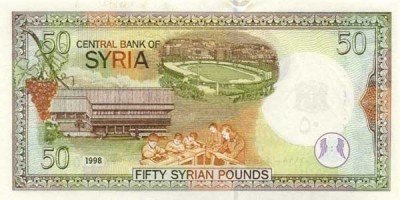 The value of the Syrian pound is down 45% on the parallel market and the stock market has slumped 40% since an uprising broke out in March 2011, the International Monetary Fund said on Wednesday.
The value of the Syrian pound is down 45% on the parallel market and the stock market has slumped 40% since an uprising broke out in March 2011, the International Monetary Fund said on Wednesday.
“The exchange rate on the black market has depreciated by 45% and 25% on the official market,” IMF deputy managing director Nemat Shafik told reporters in Beirut.
The unrest has damaged the Syrian economy but little data is available, Shafik added. “For security reasons,” the IMF has been unable to send a team to the country.
“We know that GDP has fallen but we don’t have any numbers because we haven’t had people on the ground,” she said, adding the last IMF visit took place in January-February 2011.
Meanwhile, the stock market has plunged by 40%. “The fact that the stock market has fallen by 40 percent is an important indicator of what has happened to businesses,” the IMF official said.
The strife-torn country’s economy, hit by sanctions, is expected to suffer “significant” contraction in 2012, the head of the IMF’s Middle East, North Africa, Gulf and Central Asia department, Masood Ahmed, told AFP in May.
“The impact that the sanctions will have on oil exports for Syria will be the most immediate,” Shafik said, noting that Libya’s GDP fell by 60% when exports were halted during its conflict last year.
“Oil is a much bigger part of the Libyan economy than it is for Syria,” she said. “But still, for Syria it is its major foreign exchange earner and a big revenue earner for the government.”
The Iraqi economy is also affected by the crisis, Shafik said, noting the landlocked state’s dependency on its Mediterranean neighbour.
“Syria is Iraq’s main link to the Mediterranean, so transit trade from Iraq via Syria is potentially disrupted.”
Iraq is “quite dependent” on Syria, as “a significant proportion of Iraqi imports come from Syria, particularly commodities,” she noted.
Neighbouring Lebanon has also been affected by the crisis. “We have seen a decline in trade,” Shafik said.
There has also been a decline in tourism from Syria, while Lebanese banks have withdrawn from Syria to reduce their exposure to the crisis, the IMF official added.
The EU has adopted several rounds of sanctions against Syria, expected to tighten further, to pressure President Bashar al-Assad’s regime to halt its deadly crackdown on a 14-month uprising.
In September, the EU banned Syrian crude oil imports. The EU was the main importer of Syrian oil, at 95% of the total, while the industry provided the embattled state with a third of its foreign exchange earnings.
According to IMF data, Syria’s economy grew 5.9% in 2009 and 3.4% in 2010.
CNBC

Leave a Reply
You must be logged in to post a comment.